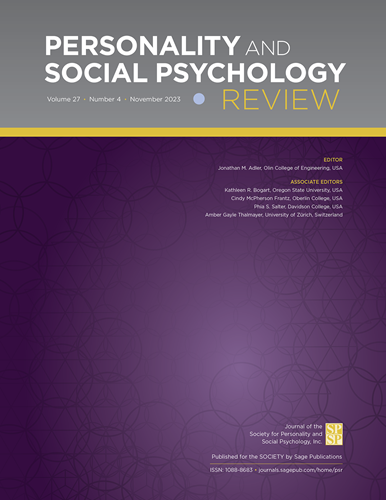关系问题解决(RePS)模型:伴侣如何相互影响以解决关系问题
IF 10.4
1区 心理学
Q1 PSYCHOLOGY, SOCIAL
引用次数: 8
摘要
在本文中,我们综合了许多领域的现有文献,引入了一个新的模型-关系问题解决(RePS)模型,以理解浪漫伴侣通过相互影响来解决关系问题的过程。第一部分简要描述了模型的关键构造和阶段。第二部分详细介绍了影响各种个人因素(如情感、自我效能)的人际行为,这些因素最终会影响伴侣的动机和能力,从而在模型的各个阶段取得进展。第三部分使用该模型生成新的预测,表明这些人际行为的有效性通常取决于环境因素。最后,第四部分讨论了该模型对理解关系问题解决的影响,强调了在解决问题过程中考虑情境作用的必要性,并提供了许多未来研究需要解决的具体预测。本文章由计算机程序翻译,如有差异,请以英文原文为准。
The Relationship Problem Solving (RePS) Model: How Partners Influence One Another to Resolve Relationship Problems
In this article, we synthesize existing literatures across numerous domains to introduce a novel model—the Relationship Problem Solving (RePS) model—for understanding the process through which romantic partners influence one another to resolve relationship problems. The first section briefly describes the key constructs and stages of the model. The second section details the interpersonal behaviors that influence various intrapersonal factors (e.g., affect, self-efficacy) that ultimately influence partners’ motivation and ability to progress through the stages of the model. The third section uses the model to generate novel predictions that suggest that the effectiveness of these interpersonal behaviors often depends on contextual factors. Finally, the fourth section discusses the implications of this model for understanding relationship problem solving, highlights the need to consider the role of context in the problem-solving process, and offers numerous specific predictions to be addressed by future research.
求助全文
通过发布文献求助,成功后即可免费获取论文全文。
去求助
来源期刊

Personality and Social Psychology Review
PSYCHOLOGY, SOCIAL-
CiteScore
19.00
自引率
1.90%
发文量
20
期刊介绍:
Title: Personality and Social Psychology Review (PSPR)
Journal Overview:
Official journal of SPSP, the Society for Personality and Social Psychology, Inc.
Premiere outlet for original theoretical papers and conceptual review articles in all areas of personality and social psychology
Features stimulating conceptual pieces identifying new research directions and comprehensive review papers providing integrative frameworks for existing theory and research programs
Topics Covered:
Attitudes and Social Cognition: Examines the inner workings of the human mind in understanding, evaluating, and responding to the social environment
Interpersonal and Group Processes: Explores patterns of interaction and interdependence characterizing everyday human functioning
Intergroup Relations: Investigates determinants of prejudice, conflict, cooperation, and harmonious relationships between social groups
Personality and Individual Differences: Focuses on causes, assessment, structures, and processes giving rise to human variation
Biological and Cultural Influences: Studies the biological and cultural mediation of social psychological and personality processes
 求助内容:
求助内容: 应助结果提醒方式:
应助结果提醒方式:


